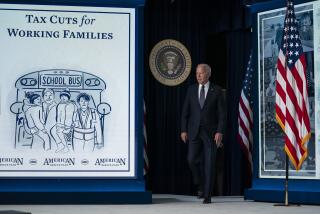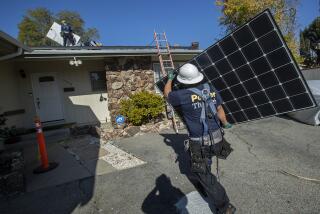A breath of stale air from GOP
Mitt Romney, who opposed government subsidies for clean power and thought all energy production technologies should compete equally in the free market, did not win the election. That’s the good news. The bad news is that his backward policies are still popular among many congressional Republicans, posing a threat to a wind-energy tax credit that is creating jobs and helping to wean the country off fossil fuels.
Unless it is extended, the tax credit will expire at the end of the year. Although it has enjoyed bipartisan support since it was created in 1992, the credit is increasingly under fire from GOP lawmakers who argue that it’s not affordable during a fiscal crisis, that it’s a form of corporate welfare that assists private wind developers but not the public, and that it’s not necessary in an era of rising and abundant production of natural gas.
The tax credit costs about $1 billion a year — hardly a budget breaker even in bad times. It supports not just developers of wind farms but companies that make turbines and other parts to supply them, accounting for an estimated 37,000 jobs. The argument that the credit doesn’t benefit taxpayers reflects a gaping blind spot many Republicans suffer when it comes to environmentally beneficial policies. Power plants that burn fossil fuels are the nation’s top source of greenhouse gas emissions, which are altering the climate in dangerous (and expensive) ways. But it’s not just about carbon dioxide: Fossil fuel plants, including those that burn natural gas — which is cleaner than coal but still highly polluting — add toxins to the air and oceans, prematurely killing thousands of people every year and boosting healthcare costs.
GOP lawmakers who bemoan corporate welfare or the picking of winners and losers by the government seldom mention the billions of dollars in special tax deductions and credits awarded to oil and gas companies yearly, nor the fact that the nation’s nuclear power industry would not exist if not for government loan guarantees that shifted the risks of construction onto taxpayers.
We too would like to see wind farms compete on their own without assistance, but the industry is still too underdeveloped for that. The ideal solution would be for Congress, when it considers tax reforms next year, to end the practice of annual renewals for the wind-power tax credit, instead approving a long-term assistance program that phases out the subsidy over time. That would provide certainty for the industry while prodding it to become more cost-efficient. Meanwhile, the lame-duck Congress must renew the subsidy before it, and its powerful public benefits, are gone with the wind.
More to Read
A cure for the common opinion
Get thought-provoking perspectives with our weekly newsletter.
You may occasionally receive promotional content from the Los Angeles Times.










